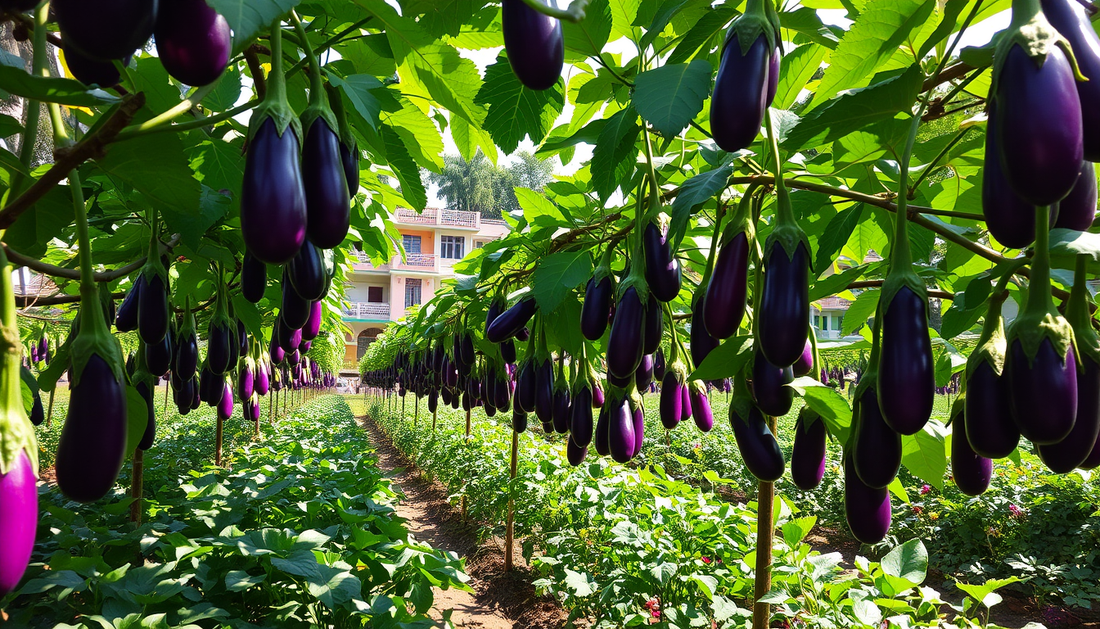
Cultivating Eggplants: A Delectable Journey in Bangalore's Climate
Share
Eggplants, also known as aubergines, are a versatile and nutritious addition to any vegetable garden. In the vibrant city of Bangalore, where the climate is often mild and conducive to a variety of crops, growing eggplants can be a rewarding and delightful experience. Whether you're a seasoned gardener or a beginner, this comprehensive guide will equip you with the knowledge and techniques to successfully cultivate these delectable nightshade vegetables in Bangalore's unique environment.
Choosing the Right Eggplant Variety
Bangalore's climate, with its moderate temperatures and ample rainfall, offers an ideal setting for growing a wide range of eggplant varieties. When selecting your eggplant seeds or seedlings, consider the following options that thrive in the region:
Classic Eggplant Varieties
- Black Beauty: A popular heirloom variety known for its deep purple, glossy skin and tender, mild-flavored flesh.
- Fairy Tale: A compact, bushy plant that produces small, elongated eggplants with a beautiful lavender and white striped pattern.
- Listada de Gandia: An Italian variety with a unique, pale purple and white striped appearance and a delicate, sweet flavor.
Specialty Eggplant Varieties
- Graffiti: A stunning eggplant with a vibrant purple and white marbled skin, perfect for adding visual interest to your garden.
- Ichiban: A Japanese variety that produces long, slender eggplants with a deep purple hue and a delicate, almost sweet taste.
- Patio Baby: A compact, bush-type eggplant that thrives in containers and small spaces, making it ideal for urban gardeners.
Preparing the Soil
Eggplants thrive in well-drained, nutrient-rich soil with a slightly acidic pH range of 5.8 to 6.8. In Bangalore, the soil can often be heavy and clay-like, so it's essential to amend it before planting.
Soil Preparation Tips
- Incorporate Organic Matter: Add generous amounts of compost, well-rotted manure, or other organic matter to the soil to improve its structure and fertility.
- Loosen the Soil: Use a garden fork or tiller to loosen the soil to a depth of 8-10 inches, allowing for better root development.
- Adjust pH: If the soil is too alkaline, add sulfur or peat moss to lower the pH. Conversely, if the soil is too acidic, add lime to raise the pH.
- Fertilize: Apply a balanced, slow-release fertilizer or a vegetable-specific fertilizer to provide the necessary nutrients for healthy plant growth.
Planting and Caring for Eggplants
Timing and Transplanting
Eggplants thrive in warm weather, so the best time to plant them in Bangalore is during the spring or early summer, typically between March and May. Start your eggplant seeds indoors 6-8 weeks before the last expected frost date, then transplant the seedlings into your garden once the soil has warmed up and the risk of frost has passed.
Planting Depth and Spacing
When transplanting, plant the eggplant seedlings at the same depth they were growing in their containers. Space the plants 18-24 inches apart in rows that are 2-3 feet apart, allowing for proper air circulation and room for the plants to spread.
Watering and Mulching
Eggplants require consistent, even moisture to produce their best yields. Water the plants deeply, about 1-2 inches per week, adjusting as needed based on weather conditions. Applying a 2-3 inch layer of organic mulch, such as straw or shredded leaves, can help retain soil moisture and suppress weed growth.
Staking and Pruning
As the eggplant plants grow, they may benefit from staking or caging to support the heavy fruit and prevent the branches from breaking. Prune off any suckers (vertical shoots that emerge from the base of the plant) to encourage a stronger, more productive plant.
Pest and Disease Management
Eggplants can be susceptible to a few common pests and diseases in Bangalore's climate. Be vigilant and take proactive measures to ensure a healthy, bountiful harvest.
Pests to Watch Out For
- Aphids: Small, sap-sucking insects that can stunt plant growth and spread disease.
- Flea Beetles: Small, jumping beetles that create small holes in the leaves.
- Eggplant Fruit Borer: Larvae that burrow into the fruit, causing damage and decay.
Disease Prevention
- Verticillium Wilt: A fungal disease that can cause wilting and yellowing of the leaves.
- Phomopsis Blight: A fungal disease that can affect the stems, leaves, and fruit.
To manage these issues, use organic pest control methods, such as introducing beneficial insects, applying neem oil, or using row covers. Maintain good garden hygiene by regularly removing affected plant material and practicing crop rotation.
Harvesting and Storing Eggplants
Eggplants are ready to harvest when the skin is shiny and the fruit is firm, with a slight give when gently pressed. Typically, eggplants are ready to pick 60-90 days after transplanting, depending on the variety.
Harvesting Tips
- Gently twist and pull the eggplant from the plant, leaving a short stem attached.
- Avoid harvesting eggplants in the heat of the day, as they are more prone to bruising.
- Regularly check the plants and harvest the eggplants as they reach maturity to encourage continued production.
Storing Eggplants
Eggplants have a relatively short shelf life, so it's best to use them as soon as possible after harvesting. If you need to store them, place the eggplants in the refrigerator, where they will keep for up to 5 days. For longer-term storage, you can freeze, pickle, or can the eggplants to enjoy their flavor throughout the year.
Growing eggplants in Bangalore's climate can be a rewarding and delicious experience. By following the tips and techniques outlined in this guide, you'll be well on your way to cultivating a bountiful harvest of these versatile nightshade vegetables. Embrace the joy of homegrown eggplants and savor the flavors they bring to your kitchen.

